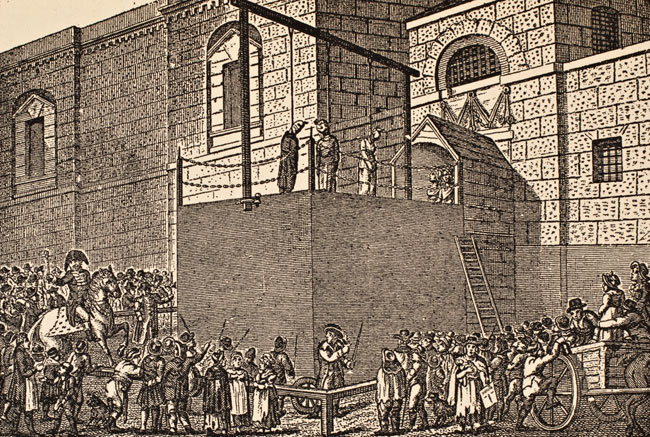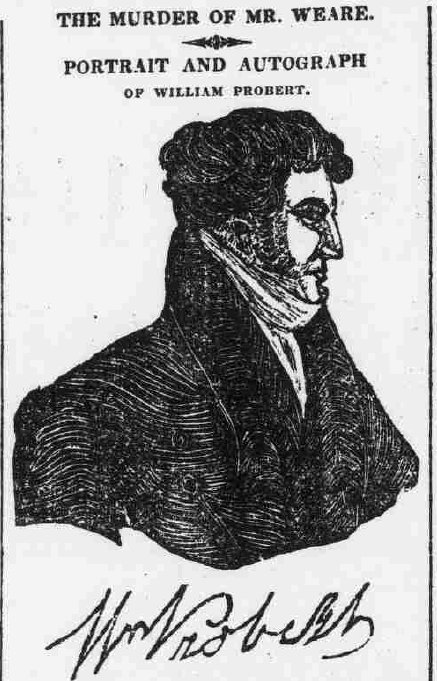
“An Execution at the Debtor’s Door of Newgate”, from The Newgate Calendar (www.exclassics.com/newgate/ngintro.htm.)
On 7 April 1825, William Probert stood trial at the Old Bailey, charged with stealing a mare from Ruardean, in the Forest of Dean, Gloucestershire. Probert was a native of the Forest of Dean, and although he had moved away to London years ago, for a couple of months he had been staying with his mother in Lydbrook. The mare was the property of Andrew Meredith, a miller, whose wife was a distant relation of Probert.
Meredith discovered that his horse was missing on the morning of 11th February, and several witnesses said they had seen William Probert riding it in the early hours of that day. The mare was eventually traced to London, where it had just been sold by Probert. The evidence against him was damning, and he was duly sentenced to death.
This looked like just another sorry story of a horse thief being caught and condemned, but there was an unusual amount of interest from the British press in the case, and the statement William Probert read out in his defence gives a clue as to why this was. He said that since “the calamitous event which occurred at Hertford”, public animosity towards him had been kept alive by the press and had reached “every part of England”. He couldn’t find work and every door had been shut against him. He had been driven to commit the crime by “fatal necessity”.
Further investigation revealed that William Probert had become very famous indeed two years earlier, due to his involvement in a murder case in Hertfordshire.
William Probert was baptised at English Bicknor Parish Church in April 1787, the son of Thomas and Jane Probert. Although his family were farmers, Probert decided on a different career path, and obtained a position as a clerk to a wine merchant in London. He did well in the capital and his prospects improved greatly when in December 1813, he married Elizabeth Noyes, the daughter of a brewer and farmer. His bride brought him money and property, and he was able to set himself up in business as a wine merchant. He did well for the first few years, but by 1818 he was getting into financial difficulties, and in 1819 he was declared bankrupt, owing £22,000.
Probert was put into the King’s Bench Prison, where he maintained a comfortable lifestyle, despite all the money he owed to his many creditors. However, he was caught stealing cash from the till of the coffee-room in the prison and was sentenced to six months imprisonment in Brixton House of Correction.
On his release, Probert carried on his extravagant way of life, despite being an uncertified bankrupt. He rented a property in Gill’s-Hill Lane, near Elstree in Hertfordshire. His wife, son and other family members stayed at the cottage most of the time, with Probert joining them at weekends, often accompanied by some of his friends, who liked to gamble, drink copiously, and go shooting.
One Friday evening in October 1823, two such friends, John Thurtell and Joseph Hunt, arranged to go to Gill’s Hill Cottage for the weekend. Thurtell suggested that Probert should drive Hunt there, while he would bring another friend with him separately. What happened that weekend is a long and complicated story, with all the protagonists giving a slightly different version of what occurred, but what is clear is that on the way to Probert’s cottage, John Thurtell murdered his travelling companion, leaving the body lying behind a hedge not far from Gill’s Hill Lane. The murdered man was brought to the cottage and deposited in the fishpond in the garden for the weekend. On the following Monday, the body was removed from the fishpond, placed in a sack, and driven away, to be disposed off elsewhere.
The fact that a murder had been committed was soon discovered, when a gore-encrusted pistol and pen-knife were found near the place where the crime had taken place. Thurtell and Hunt were identified as having been in the area that weekend, and both were taken into custody in London by a Bow Street officer. Probert was arrested later, at Gill’s Hill Cottage. Hunt swiftly confessed to his part in the crime and named the victim as William Weare, a professional gambler who had supposedly swindled Thurtell out of £300. Hunt took the police to a pond just outside Elstree, where the body of William Weare was recovered.
At the Coroner’s Inquest which followed, Probert swore that he had not known Weare, that he had known nothing about Thurtell’s plan to commit murder, and was horrified when he found out what had happened. He admitted to helping to hide the body, but said Thurtell had threatened to harm him if he did not. There was some doubt as to how much he had been involved, however. The inquest jury returned a verdict of murder against Thurtell, while Hunt and Probert were charged with being accessories to murder. All of them were committed to Hertford Gaol to await trial.
The story caused a great furore in the British Press and some very scandalous stories began to appear. It was said that Thurtell, Hunt and Probert were part of a gang of con-men who cheated at gambling. Then some newspapers declared that the three had been responsible for the murders of various wealthy men who had gone missing, and that they had a list of people they were planning to kill in the future.

“Portrait and Autograph of William Probert”, in Sussex Advertiser, 17 Nov 1823. (British Newspaper Archive. Image copyright of The British Library Board. All rights reserved.)
In December 1823, the trial of Thurtell, Hunt and Probert began, at the Hertford Assizes. It was at this time that Probert received a stroke of good fortune. The prosecution team wanted to call Probert’s wife as a key witness to the events at Gill’s Hill Cottage, but she could not by law give evidence against her husband. It was therefore decided that Probert should be allowed to turn King’s Evidence, which meant he was not prosecuted himself, in return for giving evidence against his two friends.
The trial did not proceed very far, as on the second day, the defence complained that there had been so much adverse publicity in the press, including some reports after the trial had begun, that there was no chance that the defendants would receive a fair trial, so the judge agreed to hold a special Assize in January.
The trial began again on 6 January 1824, and lasted two days. Probert gave his evidence against his former friends, and the jury found Thurtell guilty of murder, while Hunt was found guilty as an Accessory before the Fact. The judge sentenced Thurtell to be hanged on Friday, 9th January, and his body to be afterwards dissected. Hunt also was to be hanged and dissected, but no date for his execution was given. He was reprieved a few weeks later and sentence to transportation for life.
After the trial, Probert was set at liberty, but fearing that he might be confronted by one of Thurtell’s friends in town, he asked to spend the night in his cell. On the following day, he collected his wife from the inn where she had been staying during the trial, and they left Hertford, with the blinds pulled down on their carriage.
Rumours concerning Probert continued to appear in the newspapers. Despite his technical acquittal, he was widely regarded as having been more involved in the murder plot than he had admitted. Finding no former friends who would take him in or help him financially, Probert finally resorted to returning to live with his mother and her second husband, Francis James, in the Forest of Dean. Even in his former home, he found that most people shunned him. He visited his distant relation, Mary Meredith, a few times, but Andrew Meredith did not welcome his company. It was under these circumstances that he decided to steal Meredith’s horse.
William Probert was executed on 20 June 1825, alongside four other prisoners, outside the debtors’ door of Newgate Prison. He denied having known about the plot to murder William Weare to the very end. He was buried in St Martin’s churchyard. A report in the Hereford Journal said there was a delay in burying him once the small funeral party arrived at the church, because the grave had been prepared in the wrong place and another had to be dug. During the delay, a disorderly mob gathered and called out inappropriate remarks during the service. (Other newspapers made no mention of this “mob”.) None of Probert’s relatives attended at the graveside, but it was said that his mother was seen in the churchyard.
Sources:
The trial of William Probert, 7 Apr 1825, can be viewed here: http://www.oldbaileyonline.org/browse.jsp?id=t18250407-1-defend87&div=t18250407-1#highlight
Numerous newspaper sources, including:
Morning Post, 5 Nov 1823; 5, 6, 8 Dec 1823; 6, 7, 8, 9, 10, 19, 27, 28, 30 Jan 1824, 21 Feb 1825
Morning Chronicle, 10 Nov 1823, 4 Dec 1823; 9 and 31 Jan 1824
Public Ledger and Advertiser, 7 July 1819, 31 Oct 1823
Bristol Mirror, 8 Nov 1823
Hereford Journal, 29 June 1825
Family history details from the Parish Register Records of the Forest of Dean Family History Trust website, www.forest-of-dean.net.
© Jill Evans 2015